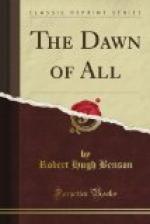Before it had burst in sparks, there roared out overhead a deafening voice of fire and thunder, shaking the air about them, bewildering the brain. Then another. Then another.
Beneath the two as they stood, shaking with the shock, silent and open-mouthed, staring at one another, in the courtyard a door banged; then another; and then a torrent of voices and footsteps as the servants and grooms poured out of the lower doors.
(III)
Two hours later the two ecclesiastics sat together, on either side of the large table in the Cardinal’s room. The Cardinal passed over the sheets one by one as he finished them. One set was being brought straight up here from the little office at the end of the hall. Another set, they knew, was simultaneously being read aloud by Lord Southminster in the hall below.
The guns had aroused even the most drowsy; and the whole population, village as well as castle, had poured into the courtyard to hear the news.
Monsignor sat and read sheet after sheet after his chief, hopelessly trying to notice and remember the principal points of the report. Everything was recorded there—the assembling of the crowds, the difficulty that the later members found in getting through into the House at all; the breakdown of the police arrangements; and the storming of the wireless station by an organized mob, many of whom had been later put under arrest.
Then there was the Prime Minister’s speech, recorded word by word in the machines, and translated later, by machinery instead of by human labour, into terms of dots and dashes, themselves transmitted again over miles of country, and retranslated again by mechanical devices into these actual printed sheets that the two were reading.
The speech was given in full, down to that tremendous scene when half the House, distracted at last by the cries that grew nearer and nearer, and the messengers that appeared and reappeared from outside, had risen to its feet. And then——
The Cardinal leaned back suddenly, with a swift indrawing of his breath that was almost the first sign of emotion that he had shown.
Monsignor looked up. The last two sheets were still under the ringed hand that lay upon the table.
“Well, it’s done,” said the Cardinal softly, almost as if talking to himself. “But it needed his last card.”
“Your Eminence?”
“The announcement as to the East,” went on the other, with the same air. “I thank God it came in time.”
“Your Eminence, I don’t understand.”
The Cardinal looked at him full.
“Why,” he said, “the Holy Father was accepted as Arbitrator of the East by the united Powers this morning. The news was in the Prime Ministers hands at six o’clock. But I’m sorry he had to use it; it would have been stronger without. . . . Don’t you understand, Monsignor? The House would have refused to vote otherwise.”




